The government is to raise childcare allowances by at least NT$1,500 (US$46.54) per month starting next year to try to boost the nation’s shrinking birthrate, the Executive Yuan said.
Starting on Jan. 1 next year, subsidies for parents with children younger than three attending public care centers are to be increased to NT$7,000 per month from NT$5,500, Premier Chen Chien-jen (陳建仁) was quoted as saying in a statement issued by the Cabinet late on Monday.
Those using publicly subsidized private childcare centers or home babysitting services are to receive NT$13,000 a month, up from NT$8,500, it said.

Photo: Tien Yu-hua, Taipei Times
Additional childcare subsidies are to be offered to parents with two or three children and those from low-income or lower-middle-income families, it added.
The government budget for measures to counter the declining birthrate has grown from NT$15 billion in 2016 to a projected NT$120.1 billion next year, Chen said.
During that time, the number of new births has plummeted, falling from 193,844 in 2017 to 138,986 last year, Ministry of the Interior data showed.
New births in the first eight months of this year are trending slightly lower than last year, totaling only 88,935.
The number of births last year and early this year was likely affected by the spread of COVID-19 last year, when the pandemic was at its worst in the nation, but the downtrend has been steady since 2017.
Chen said the government would also inject NT$21.9 billion to fund tuition subsidies of at least NT$35,000 a year to all students at private universities starting in February next year to bridge the gap between private and public university tuition fees.
The average annual tuition fee at a public university is about NT$11,000, compared with NT$62,000 at private universities, Ministry of Education data showed.
The Cabinet’s latest announcement came in the wake of campaign pledges by New Taipei City Mayor Hou You-yi (侯友宜), the Chinese Nationalist Party’s (KMT) presidential candidate, earlier the same day aimed at encouraging people to have more children.
Hou promised that if he is elected to implement a one-time housing subsidy of NT$1 million for households in an income tax bracket below 30 percent with three or more children and who do not own property.
Currently, households with three children who are in an income tax bracket below 20 percent are entitled to a monthly subsidy of NT$7,000.
The nation’s low birthrate has been driven by people getting married and having children at an older age, and by housing and childcare costs soaring, Hou said.
If elected, he would also offer a one-time subsidy of NT$20,000 for women aged 30 to 40 to freeze their eggs, along with an annual egg storage fee subsidy of NT$2,000 for a period of five years, or a maximum total subsidy of NT$30,000, he said.
The policy could benefit 30,000 individuals and would have a budget of NT$900 million, he added.

The CIA has a message for Chinese government officials worried about their place in Chinese President Xi Jinping’s (習近平) government: Come work with us. The agency released two Mandarin-language videos on social media on Thursday inviting disgruntled officials to contact the CIA. The recruitment videos posted on YouTube and X racked up more than 5 million views combined in their first day. The outreach comes as CIA Director John Ratcliffe has vowed to boost the agency’s use of intelligence from human sources and its focus on China, which has recently targeted US officials with its own espionage operations. The videos are “aimed at

STEADFAST FRIEND: The bills encourage increased Taiwan-US engagement and address China’s distortion of UN Resolution 2758 to isolate Taiwan internationally The Presidential Office yesterday thanked the US House of Representatives for unanimously passing two Taiwan-related bills highlighting its solid support for Taiwan’s democracy and global participation, and for deepening bilateral relations. One of the bills, the Taiwan Assurance Implementation Act, requires the US Department of State to periodically review its guidelines for engagement with Taiwan, and report to the US Congress on the guidelines and plans to lift self-imposed limitations on US-Taiwan engagement. The other bill is the Taiwan International Solidarity Act, which clarifies that UN Resolution 2758 does not address the issue of the representation of Taiwan or its people in

US Indo-Pacific Commander Admiral Samuel Paparo on Friday expressed concern over the rate at which China is diversifying its military exercises, the Financial Times (FT) reported on Saturday. “The rates of change on the depth and breadth of their exercises is the one non-linear effect that I’ve seen in the last year that wakes me up at night or keeps me up at night,” Paparo was quoted by FT as saying while attending the annual Sedona Forum at the McCain Institute in Arizona. Paparo also expressed concern over the speed with which China was expanding its military. While the US

SHIFT: Taiwan’s better-than-expected first-quarter GDP and signs of weakness in the US have driven global capital back to emerging markets, the central bank head said The central bank yesterday blamed market speculation for the steep rise in the local currency, and urged exporters and financial institutions to stay calm and stop panic sell-offs to avoid hurting their own profitability. The nation’s top monetary policymaker said that it would step in, if necessary, to maintain order and stability in the foreign exchange market. The remarks came as the NT dollar yesterday closed up NT$0.919 to NT$30.145 against the US dollar in Taipei trading, after rising as high as NT$29.59 in intraday trading. The local currency has surged 5.85 percent against the greenback over the past two sessions, central